Pregnant with twins: Everything you need to know
It's twice as nice but is it twice the work? If you're pregnant with twins then you'll probably have a lot of questions. Here, we take a look at the ways your mulitple pregnancy may be different.

Being pregnant is both nerve-wracking and exciting but what if you discover that you’re pregnant with twins? It's twice as nice, but is it twice the work?
If you’re pregnant with twins then you'll probably have a lot of questions, such as: Why am I having a multiple pregnancy? Will being pregnant feel different week by week? And what about twin baby names?
You may also wonder if you can have home birth or weigh up the pros and cons of water birth. Here, three experts answer your twin pregnancy queries.
How did I become pregnant with twins?
‘The common factors that increase the chance of having twins are: advanced age of the mother (more than 35 years); those in their second or third pregnancy having had healthy children; non-Caucasian races such as Afro-Caribbean; and, at times, a family history of having twin pregnancy,’ explains Professor Ranjit Akolekar, a consultant in fetal medicine and obstetrics and the founder of The Pregnancy Clinic, which has clinics in Kent and Surrey.
‘It’s also more likely for women to have twins if the couple have undergone fertility treatment such as IVF,’ says Dr George Attilakos, a consultant in fetal medicine and obstetrics at The Portland Hospital (which is part of HCA Healthcare). ‘However, in the last few years it’s become recommended practice in the UK to transfer one embryo during IVF. This has reduced the number of IVF pregnancies resulting in twins,’ he explains. ‘This is per the Human Fertilisation & Embryology Authority’s guidance, in order to reduce the chance of having a multiple pregnancy, as it can pose more risks to mum and babies.’
If you have a twins in your extended family it does raise your chance in certain circumstances. ‘You’re more likely to have twins, triplets or more if there’s a maternal history of multiple pregnancies,’ says Alyson Chorley, senior communications & campaigns officer for Twins Trust. ‘And a father can pass on the gene to his daughter. However, it won’t impact his partner having twins,' she says. 'What’s certain is that if you already have fraternal (non-identical) twins, triplets or more, then you’re five times more likely to carry multiples in your next pregnancy,’ she explains.
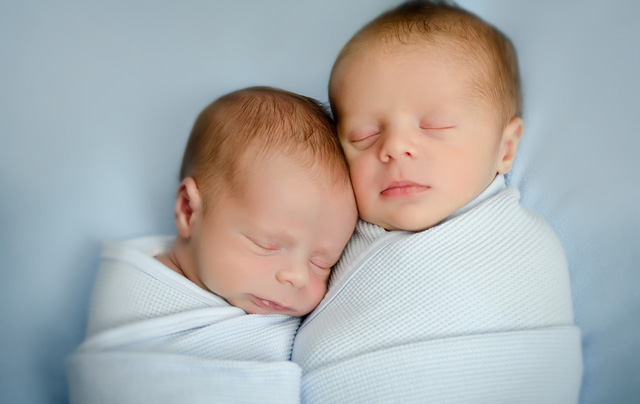
One of the first thoughts you may have if you're pregnant with twins is whether you'll have identical or non-identical babies. ‘Identical twins occur in about one third of multiple pregnancies and aren’t hereditary,' says Alyson. 'Overall, the likelihood of having identical twins (monozygotic) is about 1 in 250 (about 0.5%),' says Alyson.
GoodtoKnow Newsletter
Parenting advice, hot topics, best buys and family finance tips delivered straight to your inbox.
'They occur when a single embryo splits in two soon after fertilisation, creating identical babies with the same genes, physical features and sex. This is why identical twins have identical DNA. However, characteristics such as size and personality depend on non-genetic factors, so your babies may be different sizes,’ she adds.
‘Non-identical twins are created when a woman produces two eggs at the same time and both are fertilised by a different sperm. These non-identical twins are known as dizygotic or fraternal twins because they grew from different zygotes (fertilised eggs),’ she explains. ‘The babies are no more alike than any brother or sister. They may both be male, female or one of each – they just happen to be made at the same time.’
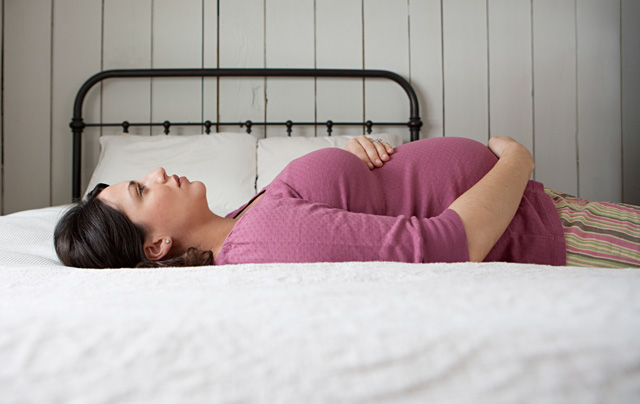
What are the symptoms of twins in early pregnancy and how soon will you know for certain?
‘If a woman is pregnant with twins, the early pregnancy symptoms such as morning sickness and vomiting, tiredness and constipation can be a bit more exaggerated,’ says Professor Akolekar. ‘However, there’s a considerable overlap with symptoms even in singleton pregnancies and, therefore, it’s impossible based on pregnancy symptoms to gauge whether a woman is having a singleton or twin pregnancy,’ he explains.
‘The only investigation that can confirm whether a mother is having a twin pregnancy is a pregnancy scan in early pregnancy,’ he continues. ‘The ultrasound scan can also confirm the type of the twin pregnancy – i.e., identical or non-identical (which in medical terms is called a monochorionic or dichorionic pregnancy). A monochorionic pregnancy is where the twin babies are sharing the same placenta and dichorionic pregnancy is where each baby has its own placenta.
‘A scan is the only way to know for certain if you are expecting twins or more,’ reiterates Alyson. ‘And this news can come as a big surprise. Some people are delighted! Others worry how they'll cope. Don’t panic. Other parents have been there before you and have not only survived the experience, but have gone on to thrive with their babies. So can you,’ she says, reassuringly.
‘It may help to ask for a picture of the babies at the very first ultrasound. Looking at this may help the situation feel more real. Making practical plans can also help. Twins Trust's free webinar An Introduction to the world of Twins, Triplets and More offers support and advice to pregnant women and their partners at the start of their pregnancy journey,’ she advises.
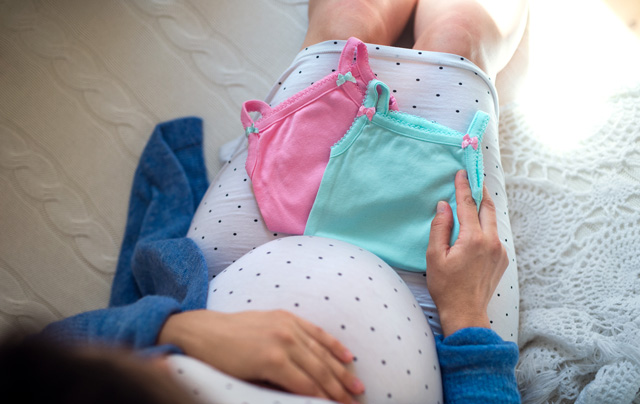
How is pregnancy with twins different?
‘Twin pregnancies are quite different from singleton pregnancy,’ says Professor Akolekar. ‘First and foremost, pregnancy symptoms such as morning sickness and feeling tired are a lot more pronounced in twins than in singletons,’ he states. ‘Secondly, not all twins pregnancies are the same,’ he continues. ‘It’s important to differentiate between the two as the chance of pregnancy complications in monochorionic pregnancies is 10-20 times higher than in dichorionic twins. Therefore, the level of monitoring required is completely different. For example, women with a dichorionic pregnancy generally have six ultrasound scans for monitoring the babies' wellbeing. For those with a monochorionic pregnancy, they have 12 ultrasound scans minimum,’ he explains.
Don’t be concerned if you put on what seems like a lot of weight. ‘Expectant mums of twins will usually put on more weight than someone expecting just one baby,’ explains Alyson. ‘Along with carrying two (or three babies) it’s due to the placenta(s) and amniotic fluid. However, the advice on diet, lifestyle and nutritional supplements is usually the same for someone expecting one baby.’
‘Mothers with a twin pregnancy also have more pregnancy symptoms later in the pregnancy. Usually it's tiredness, breathlessness, having a larger bump, pelvic discomfort and constipation,’ says Professor Akolekar. ‘They require closer monitoring of labour and require delivery on the medically-led labour ward rather than the midwifery-led birthing unit. Compared to singleton pregnancies, the chance of a caesarean section is higher. But many twin pregnancies have a normal vaginal birth, although the specific care plan for each woman needs to be personalised based on pregnancy findings,’ he explains.
‘Most twins and triplets grow normally in the womb,’ adds Alyson. ‘Although they tend to be a little smaller than singleton babies and will be delivered earlier,' she says.
‘Needless to say, after a successful delivery, the experience of caring for two babies is different than caring for one,’ concludes Professor Akolekar. ‘Most mothers would benefit from taking advice from their midwife, pregnancy support groups and online NHS support information,’ he says. Feeding newborn twins is logistically trickier but there’s plenty of information available. Alternatively, ask a medical professional, or contact a support group or charity such as Twins Trust.
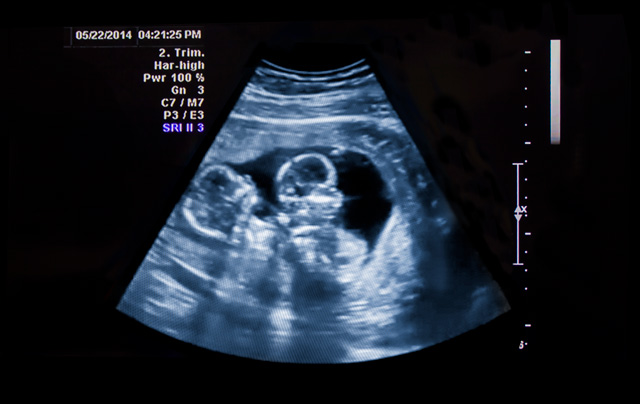
What happens in the first trimester with twins?
‘The first trimester is one of the most important periods during the pregnancy,’ says Professor Akolekar. ‘Confirmation of a twin pregnancy is based on the ultrasound scan, which can show the presence of a twin pregnancy and provide accurate dating. If this scan is carried out before 11 weeks, it should be repeated again between 11-13 weeks to accurately date the pregnancy and estimate the due date, to ensure both foetuses are developing normally, and to rule out any major birth defects,' he says.
'It's also to check for genetic defects such as Down’s syndrome and, most importantly, diagnose the type of twin pregnancy. The last objective is, at times, the most important. This is because the chance of complications, the intensity of monitoring of the pregnancy, and the outcome depends on whether the twins share a placenta or not – i.e. whether they’re monochorionic or dichorionic,’ he explains.
‘You should ensure that you know exactly what your care will look like throughout your pregnancy,’ advises Alyson. ‘Twins Trust has a multiple pregnancy checklist which sets out the exact type of care you should be receiving. Also, check here to see if your local hospital has a Twins Clinic,’ she says.
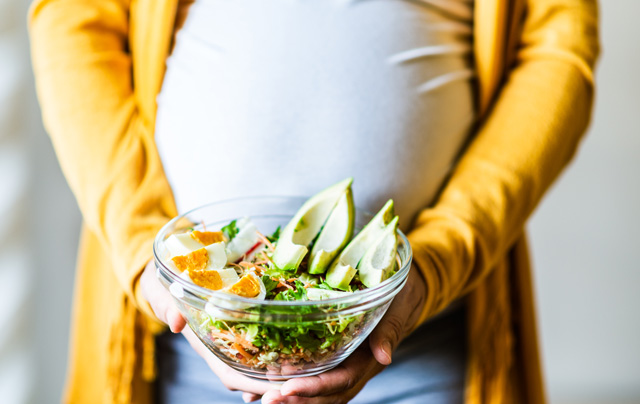
Are there more risks when being pregnant with twins?
Yes, there are raised risks if you are pregnant with twins. But try not to let that worry you. ‘Almost all pregnancy complications are more likely with twins,’ says Dr Attilakos. ‘However, most mums and babies will remain healthy. The main risk when being pregnant with twins is that a woman might give birth before their full term. About half of all twin pregnancies deliver before 36 weeks and 5-10% deliver before 32 weeks. Therefore, it’s vital that pregnant women and their partners are aware of the symptoms of labour, so they can seek advice quickly should they go into labour early,’ he explains.
‘There’s also more of a risk of pre-eclampsia for women who have multiple pregnancies,' he adds. 'Especially if they’re a slightly older mother, carrying their first pregnancy, have experienced pre-eclampsia before, or have a higher BMI,’ he continues. ‘Doctors prescribe a low daily dose of aspirin as a preventative measure to reduce the risk of developing pre-eclampsia,’ he says.
‘Anaemia is also more likely in multiple pregnancy mothers,’ adds Dr Attilakos. ‘Therefore, pregnant women need to ensure they continue to eat an iron-rich diet and undergo frequent blood tests as a preventative measure,’ he advises.
‘Finally, there’s more of a risk if you’re pregnant with monochorionic twins, as there’s an increased risk of complications due to the shared placenta. This can lead to twin-to-twin transfusion syndrome as well as selective growth restriction – potentially serious complications,’ he explains.
While this sounds concerning, there’s never been a safer time to give birth. ‘Thankfully, due to medical advancements we have access to technology that allows us to more accurately identify any potential risks and act accordingly. This increases the chance of a safe pregnancy and labour – resulting in happy, healthy babies,’ says Dr Attilakos.
‘Try to not worry about the risks, especially if you are expecting triplets or identical twins who share a placenta,’ says Alyson. ‘The most important thing to remember is that thousands of twins are born every year. For the vast majority of families the care is good and their bundles of joy will be happy and healthy,’ she says.
Post-birth, it's worth being aware that mothers of multiples have a slightly raised risk of postnatal depression. If you feel like you’re struggling don’t be afraid to speak up – the NHS offers this advice or speak to your GP, midwife or health visitor. They won’t judge you and will be able to help.
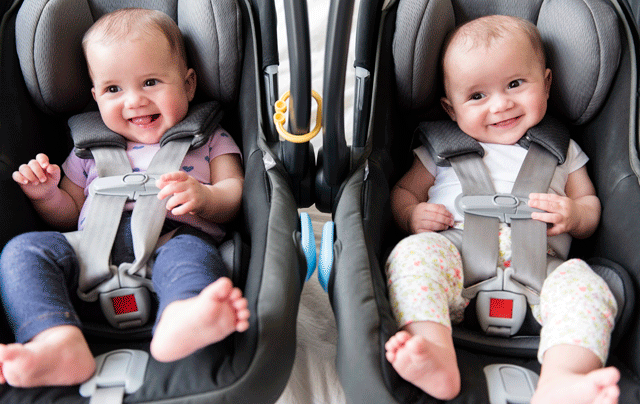
How do I prepare for twins – what will I need to buy?
From a practical point of view you’ll need two or more of many things if you're pregnant with twins. This newborn baby essentials checklist is a good start, though you won't need two of everything on the list. You don’t need to buy everything new. Look on local parenting forums or Facebook groups in your area for goods that parents are selling.
‘Make sure you stock up on plenty of nappies, wipes and baby sleepsuits,’ says Alyson. ‘Then there are certain pieces of equipment that you will absolutely need two of – car seats, for example.’ A nursing pillow is useful, as is a baby rocker if you want to out one baby down while you take care of the other and – when they're being weaned – high chairs. You may also want a breast pump if you're planning on doing any bottle feeding.
Car seats are an expensive buy and not something you can really scrimp on. Try to buy new – if you do come into some second-hand car seats make sure they’re from someone you trust. Old car seats or ones that have been in an accident can show signs of wear and tear or damage. They may not be up to modern safety standards.
You’ll also need to consider cots. When your twins are little, it might be easiest to get them to sleep in two Moses baskets that you can move from room to room. If you'd rather get them sleeping in a cot early on, invest in a cot bed. These are a bit bigger, so it should fit them both for a while. This is called co-bedding, and is perfectly safe, says the NHS. If you're planning some overnight stays with the babies then a travel cot is useful. One will big enough to fit two in the early months.
When deciding on prams you will need to choose what type of system you’d like. Do you want to get a pram then move on to a pushchair, or invest in a pushchair from birth. Would you like your babies to be side-by-side or one behind the other. There are benefits and drawbacks to both. Side-by-side twin pushchairs tend to be a little bit cheaper. Most are suitable from birth, but will also do for carting your twins around as toddlers. Some mums find them awkward, though. Their width can cause problems going in and out of narrow doorways and carrying them up and down stairs.
One-behind-the-other pushchairs eliminate the problem with narrow doorways but tend to cost a bit more. Alway check that it's suitable from birth because the back seat is often designed for an older child, and the front for a newborn. One drawback is that as they get older your twins may argue about which seat they want to sit in.
‘One of the best places to ask for advice on what to buy is from other families. You can do this via the Twins Trust Community Forum,’ advises Alyson. ‘Check the parent recommendations thread. There are discussions on what’s the best car to buy, buggies and prams, play mats, high chairs, cots and Moses baskets, baby monitors and even car mirrors for twins,’ she says.

Debra Waters is an experienced online editor and parenting writer. She also has a strong background on health, wellbeing, beauty, and food. She currently writes for Goodto and Woman&Home, and print publications Woman, Woman’s Own, and Woman’s Weekly. Debra has written for What to Expect, Everyday Health, and Time Out. In addition, she has had articles published in The Telegraph and The Big Issue.